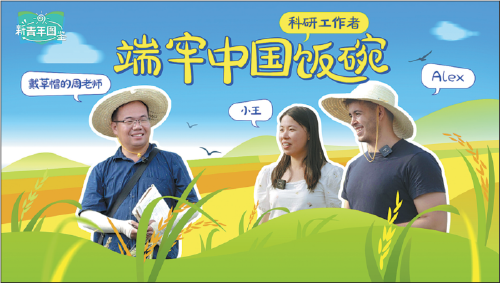More than a grain of determination
Scientist dedicates himself to developing new strains of rice to ensure food security for future generations of Chinese, Wang Xingwei reports.
China's No 1 Central Document, which is the first policy statement released by the country's central authorities each year, puts an emphasis on agricultural and rural development for 2023. This is also the 20th No 1 Central Document of this century to focus on agricultural and rural affairs.
Dedicating himself to agricultural development, based on his scientific research, Zhou Lei, 40, aspires to make sure that Chinese people not only get enough to eat, but also eat well, echoing one of the most important tasks in the No 1 Central Document — strengthening agriculture through science and technology.
A researcher at the Institute of Food Crops, Hubei Academy of Agricultural Sciences, Zhou, also a winner of the China Youth May Fourth Medal — the top honor for outstanding young Chinese people — has made major progress in the genetic breeding of rice and application research over the years. So far he has cultivated 16 new varieties of rice, increasing grain production by more than 1.5 billion kilograms, which ensures China has sufficient grain stocks to feed its people.
Zhou is working with a group of highly educated and skilled young people, most of whom hold doctorate degrees. According to Zhou, it usually takes people more than 10 years of academic training to become qualified for the research job. Zhou has been offered opportunities to go abroad and exchange experiences with peers overseas. An academic visit to the United States made Zhou realize that, even though China was playing a leading role in global rice research, its agricultural industry lagged behind other affluent countries.
"With a smaller population and richer resources, the US has achieved the mechanization of the agricultural sector, resulting in higher yields per acre and lower rice prices. We, Chinese researchers, still have a long way to go," he notes.
Upon returning to China, Zhou pledged to apply all he learned to solving the problems faced by the nation's agricultural industry. He and his team now work more than 300 days a year. They have cracked the "hardest nut" in rice-breeding technology — the cloning of cold-tolerant genes in rice — for the first time ever. Such breakthroughs effectively tackle the risks of grain reduction.
However, instead of staying in an air-conditioned office, grain experts like Zhou spend most of their time, literally, in the field. The whole base of Zhou's academy covers an area of about 200 hectares, while his team has over 4 hectares of field.
Eight people from the team spend at least seven to eight hours every day doing related on-site experiments. In order to develop a quality rice variant that has a good look, taste and texture, Zhou and his team have collected germplasm and selected mate parents for almost 10 years.
Breeding is an arduous process, heavily affected by sunlight and temperature, and Zhou always tends his crops with round-the-clock care. "We have to carefully protect them from being drowned in the water, or being eaten by birds and rats, just like caring for a newborn baby," Zhou says.
It is not always plain sailing, though. As Zhou has admitted, sometimes scientific research requires luck.
"In the past, some researchers might not be able to breed a new variety despite a lifetime of trying," adds Zhou, explaining that agriculture has always been sensitive to climate change throughout history. In August, southern China suffered from extremely high temperatures, which had a serious impact on the crops in Zhou's experimental field — some of them even withered. Zhou, though, never got downhearted. Seeing things from a different perspective, Zhou believed it opened a window for him to do further study. "Sometimes we just need that sudden high temperature to give us the proper conditions, which help us select the rice," he notes.
The hard work eventually paid off. After going through tens of thousands of crossbreeding combinations, Zhou and his team have successfully created a number of variants to meet the demands of the population. Besides making a breakthrough in crop yields and rice quality, Zhou has also developed a kind of "functional rice" — low-glycemic rice — for those living with diabetes. "It has some starch that can't be degraded. Therefore, the starch won't turn into sugar even if we feel full," Zhou explains.
With the rising living standards, China's food market has also experienced a consumption upgrade. Noticing Chinese people's great appetite for crayfish, Zhou and his team have introduced the method of rice-crayfish farming after years of field research. They help farmers raise crayfish in rice paddies, which can triple the income of farmers and enrich people's dining tables at the same time.
As for Zhou, despite tough working conditions, the research work has brought him a sense of happiness and fulfillment.
"It's nice just to be able to taste your own creation and know that what you have done will benefit more people in the future," says Zhou.
After a hard day of work, Zhou loves to take a walk in the fields, enjoying the peace and tranquility while watching the beautiful sunset.
That's the best reward for him.
Contact the writer at wangxingwei@21stcentury.com.cn



















